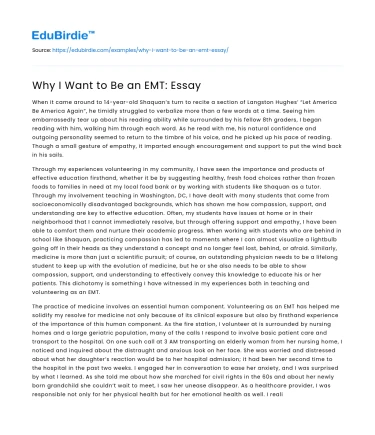When it came around to 14-year-old Shaquan’s turn to recite a section of Langston Hughes’ “Let America Be America Again”, he timidly struggled to verbalize more than a few words at a time. Seeing him embarrassedly tear up about his reading ability while surrounded by his fellow 8th graders, I began reading with him, walking him through each word. As he read with me, his natural confidence and outgoing personality seemed to return to the timbre of his voice, and he picked up his pace of reading. Though a small gesture of empathy, it imparted enough encouragement and support to put the wind back in his sails.
Through my experiences volunteering in my community, I have seen the importance and products of effective education firsthand, whether it be by suggesting healthy, fresh food choices rather than frozen foods to families in need at my local food bank or by working with students like Shaquan as a tutor. Through my involvement teaching in Washington, DC, I have dealt with many students that come from socioeconomically disadvantaged backgrounds, which has shown me how compassion, support, and understanding are key to effective education. Often, my students have issues at home or in their neighborhood that I cannot immediately resolve, but through offering support and empathy, I have been able to comfort them and nurture their academic progress. When working with students who are behind in school like Shaquan, practicing compassion has led to moments where I can almost visualize a lightbulb going off in their heads as they understand a concept and no longer feel lost, behind, or afraid. Similarly, medicine is more than just a scientific pursuit; of course, an outstanding physician needs to be a lifelong student to keep up with the evolution of medicine, but he or she also needs to be able to show compassion, support, and understanding to effectively convey this knowledge to educate his or her patients. This dichotomy is something I have witnessed in my experiences both in teaching and volunteering as an EMT.
The practice of medicine involves an essential human component. Volunteering as an EMT has helped me solidify my resolve for medicine not only because of its clinical exposure but also by firsthand experience of the importance of this human component. As the fire station, I volunteer at is surrounded by nursing homes and a large geriatric population, many of the calls I respond to involve basic patient care and transport to the hospital. On one such call at 3 AM transporting an elderly woman from her nursing home, I noticed and inquired about the distraught and anxious look on her face. She was worried and distressed about what her daughter’s reaction would be to her hospital admission; it had been her second time to the hospital in the past two weeks. I engaged her in conversation to ease her anxiety, and I was surprised by what I learned. As she told me about how she marched for civil rights in the 60s and about her newly born grandchild she couldn’t wait to meet, I saw her unease disappear. As a healthcare provider, I was responsible not only for her physical health but for her emotional health as well. I realized she was more than just another geriatric patient to transport; she was a multifaceted individual who was under my care.
Shadowing physicians showed me empathy’s significance in a physician’s daily practice. When shadowing Dr. Lee, I observed him perform a breast biopsy on a scared and concerned woman. During the process, he assuaged her concern by explaining every step in an easy-to-understand way while answering her rapid-fire questions in a calm, understanding manner. After the procedure, I could tell the patient had the utmost confidence in Dr. Lee’s abilities due to his compassionate nature.
Shadowing physicians also further invigorated my interest in medicine’s evolution. As an EMT, I was attracted to the continual learning involved in keeping up with the advancements and advents in medicine that changed medical standards, protocols, and treatments year to year. While shadowing, I noticed not only how advancements in medical technology have affected Dr. Lee’s field of radiology, but also how, after years of practice, he continually follows new medical literature to improve his skills and deliver better care to his patients. A physician’s education does not stop after graduation; the need for constant learning to keep up with the changing medical landscape truly draws me to medicine.
Medicine encompasses more than knowledge of diseases and treatment: an effective physician needs to have high empathy and emotional intelligence as well. Physicians deal with complex individuals with complicated emotions and concerns. Physicians must be perpetual students to address these concerns and deliver high-quality care. In the same way, I empathize with my students to effectively educate as a teacher, I want to be a physician who treats his patients while emphasizing the importance of their emotional well-being. I want to continually learn about developments in medicine to ensure the highest standard of care for my patients.






 Stuck on your essay?
Stuck on your essay?

